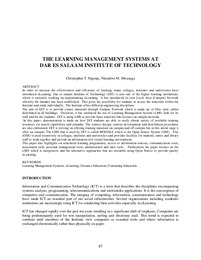The Learning Management Systems At Dar Es Salaam Institute Of Technology

View/
Date
2005Author
Mgonja, Christopher T.Mwasaga, Nkundwe M.
Publisher
University of ZilinaPlace of publication
CY - ΛευκωσίαSource
CBLIS Conference Proceedings 2005 Integrating New Technologies in Science and EducationGoogle Scholar check
Keyword(s):
Metadata
Show full item recordAbstract
In order to increase the effectiveness and efficiency of learning, many colleges, institutes and universities have introduced eLearning. Dar es salaam Institute of Technology (DIT) is also one of the higher learning institutions, which is seriously working on implementing eLearning. It has introduced its own Local Area (Campus) Network whereby the Intranet has been established. This gives the possibility for students to access the materials within the Institute and study individually. The Institute offers different engineering disciplines. The aim of DIT is to provide course materials through Campus Network which is made up of fiber optic cables distributed in all buildings. Therefore, it has embraced the use of Learning Management System (LMS) both for its staff and for the students. DIT is using LMS to provide these materials like lectures on campus network.
In this paper, demonstration is made on how DIT students are able to easily obtain variety of available training resources via search capabilities and calendar. The courses design; courses development and distribution procedures are also elaborated. DIT is striving on offering training materials on campus and off-campus but at this initial stage it offer on campus. The LMS that is used by DIT is called MOODLE which is the Open Source System (OSS). This (OSS) is used extensively in colleges, institutes and universities and provides facilities for students, tutors and library staff to work together and provide an information rich virtual learning environment.
This paper also highlights on structured learning programmes, access to information sources, communication tools, assessment tools, personal management tools, administrator and tutor tools. Furthermore the paper focuses on the LMS which is inexpensive and the alternative approaches that are available using Open Source to provide quality eLearning.
